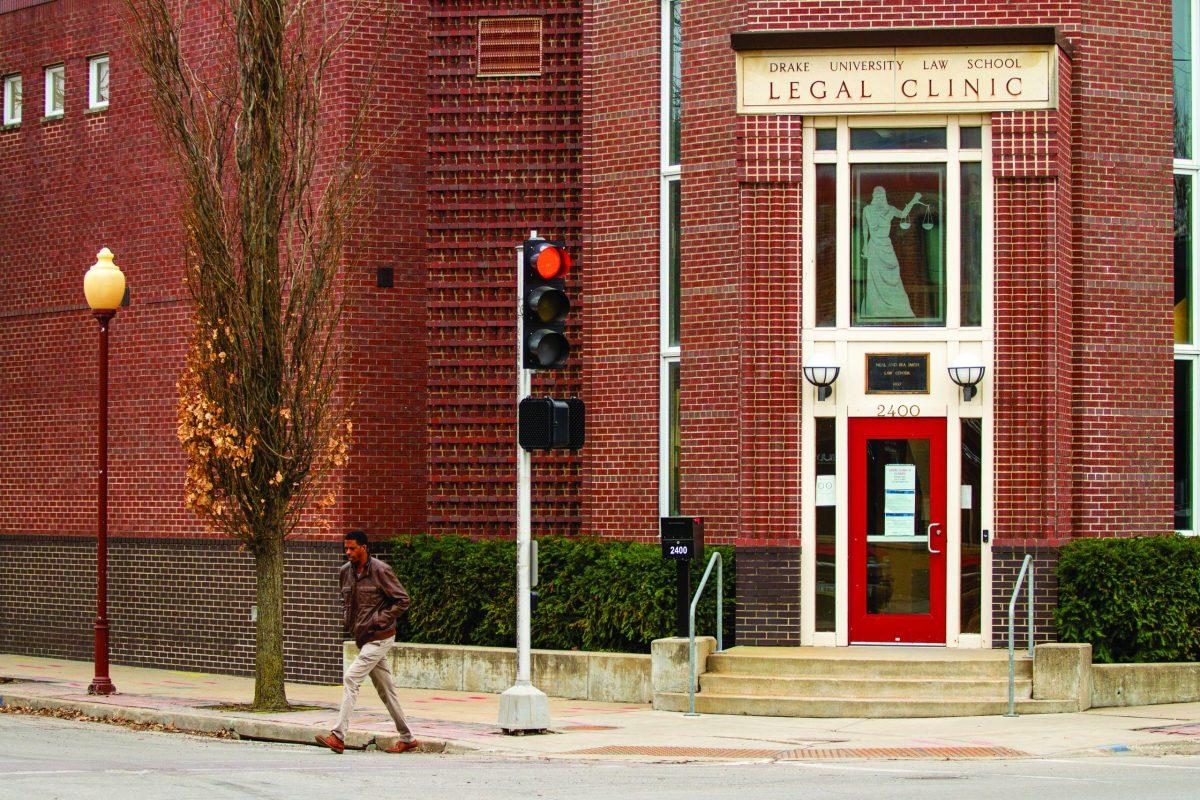The trial of Des Moines Register reporter Andrea Sahouri ended with an acquittal of all charges last week.
After a three-day trial at the Drake Legal Clinic, a jury found both Sahouri and her former boyfriend Spenser Robnett not guilty of interference with official acts and failure to disperse.
Sahouri was at Merle Hay Mall reporting on a George Floyd protest on May 31, 2020, when she fled from tear gas and was pepper sprayed and arrested.
The prosecution argued that neither defendant responded to dispersal orders issued by police, and that both interfered with official acts by pulling Sahouri away from arresting officers.
Des Moines Police Lt. Chad Steffen’s testimony related to whether dispersal orders were given prior to Sahouri’s arrest. Staffen’s body camera recorded footage of himself and other officers clearing the street while the messages “disperse” and “protest peacefully” were delivered over a public address system. Defense attorney Nicholas Klinefeldt argued these statements did not constitute a clear order for everyone to leave the scene.
Luke Wilson, the Des Moines officer who arrested Sahouri and Robnett, testified that he pepper sprayed a group of people to encourage dispersal and arrested Sahouri when she did not leave. He also testified that when he went to arrest her, Sahouri pulled away and Robnett also attempted to pull her away by grabbing her arm, which led to the interference charges. On the stand, both Sahouri and Robnett denied Wilson’s claims that they resisted her arrest.
“I charged her with interference for trying to pull away from my grasp, as I charged Mr. Robnett when he tried to interfere with my custody,” Wilson said, according to the Des Moines Register.
The arrest was not recorded because Wilson said he thought he had turned on his body camera when he arrived at the protest, but discovered later that he was not recording at the time he arrested Sahouri. Body cam footage can sometimes be retrieved even when an officer was not recording, but by the time Wilson realized the camera was not recording too much time had passed to retrieve the footage.
Defense witness Des Moines police Sgt. Natale Chiodo captured footage on his body camera of Sahouri being arrested and Robnett on the ground.The footage recorded Sahouri telling police she is a journalist covering the protest.
Former Register reporter Katie Akin, who covered the protest with Sahouri testified she did not hear orders to disperse from police and did not witness resistance from Sahouri or Robnett during her arrest, although she did not see the first moments of their interaction.
“I started to yell that we were reporters because I wanted to make it clear to officers that we were there to do our job,” Akin said, according to the Des Moines Register. “I understood us to be in the right and to be there to report, and I didn’t understand why they were detaining Andrea.”
Sahouri testified to her actions when Wilson pepper sprayed and arrested her. She also said she was only there to report on what was happening.
“I didn’t think it was a good idea to run from officers because I wasn’t doing anything wrong,” she said, per the Des Moines Register. “I put up my hands and said ‘I’m press, I’m press,’ and he grabbed me and pepper-sprayed me and told me, ‘that’s not what I asked,’”.
The fact that Sahouri’s role as a journalist was not mentioned more during the trial was surprising to some first-year Drake law students.
“They pretty much decided right away that it didn’t matter that she was a reporter. Both prosecution and defense said that that wasn’t really a factor because it didn’t matter,” first-year law student Kolby Whisner said. “I didn’t expect that, I expected it to be more about whether or not you could discern that she was a reporter doing the job.”
After each day of the trial, students discussed the case with professionals from the legal and journalism communities including a retired judge, a former KCCI employee and Drake’s Dean of Journalism and Mass Communication. Whisner said he learned during these sessions that the law does not actually provide a legal right for journalists to be at protests. He also said the group discussed whether this right for journalists should be a codified law to avoid similar arrests.
For Thomson Coffey, another first-year law student, this lack of legal rights for journalists at protests illuminated why it was not a dominant factor in Sahouri’s trial.
“I thought [being a journalist] mattered in the law beforehand, so it was surprising that it didn’t matter but knowing that it didn’t, I wasn’t surprised that they didn’t highlight it,” Coffey said.
Both students said they suspected the case would end with a not guilty verdict after watching the trial the first day.
“Once [the defense was] able to call three people who were all saying the exact same thing, it was like we have a good idea of what’s happening,” Coffey said.
“There were some arguments that you could see maybe getting a guilty for one [charge] or the other here or there,” Whisner said. “There were bits and pieces, but just knowing how the court system works it’s not enough to just be maybe to convict, it has to be beyond a reasonable doubt.”
Categories:
Des Moines Register Reporter Acquitted
Mar 17, 2021
0
Donate to The Times-Delphic
$840
$1000
Contributed
Our Goal
Your donation will support the student journalists of Drake University. Your contribution will allow us to maintain the website and keep our publication going.
More to Discover







